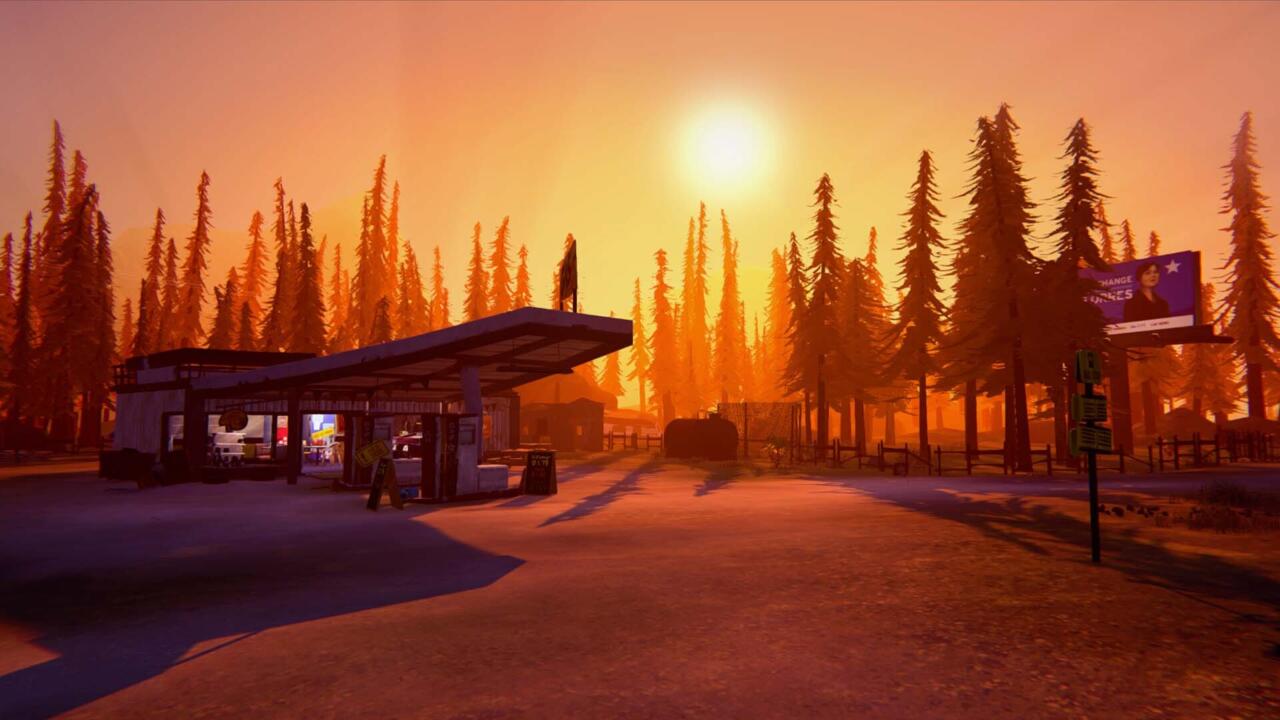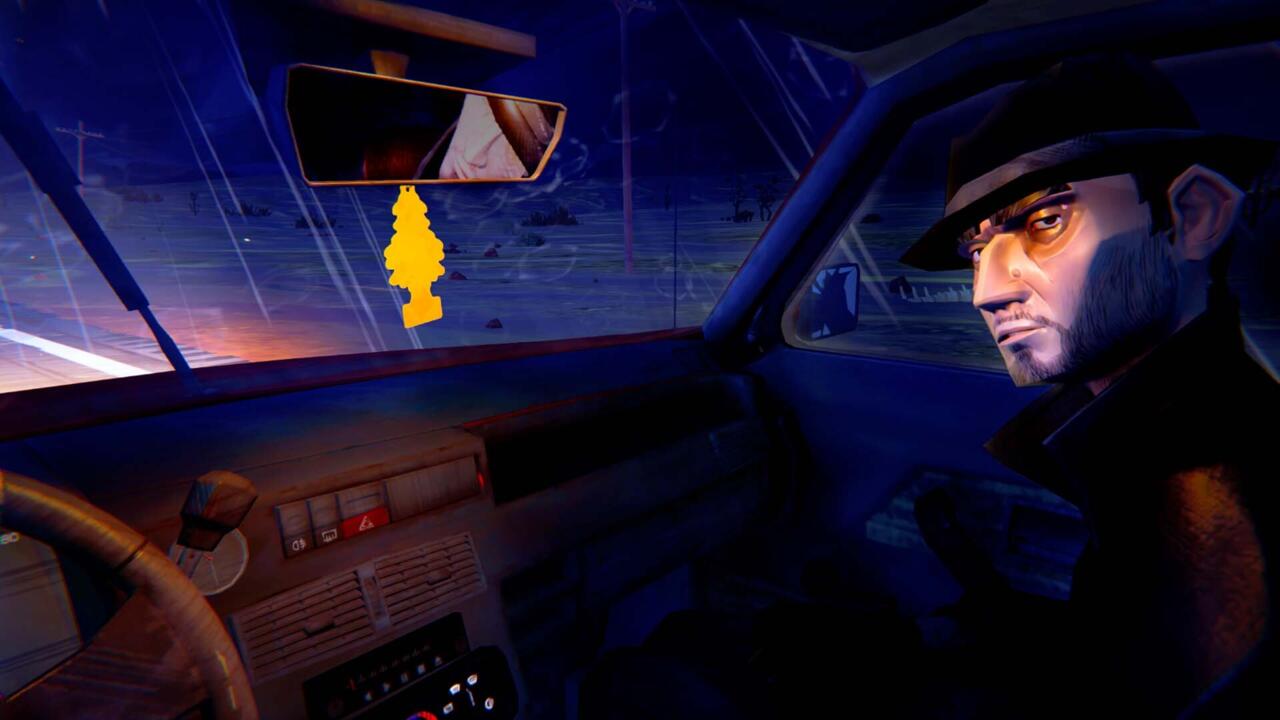Petria, the fictional country at the center of Road 96, is in rough shape. Throughout 1996, the country is gripped by political turmoil--now, a moderate-leaning candidate is threatening the long-standing regime of a totalitarian dictator while a growing resistance threatens to send the country's youth boiling over and into a full-on revolution. Add to that a growing number of teenagers seeking life outside of the country's walled borders and you've got a recipe for potential disaster on election day. This is what each of Road 96's procedural journeys delicately build towards with some strong character writing and entertaining gameplay vignettes, even if the central conflict is too reductive with its overall messaging.
Each episode of Road 96 puts you in control of a faceless and nameless teenager--one of many looking to escape Petria by making the dangerous journey to its border and attempting to get over its oppressive wall. You're given the choice between three teens before a run, each with different starting attributes that dictate how much cash you initially have on hand, your overall energy, and your distance from the border. The first two are the most important to consider as cash can open numerous interactions throughout the run--such as purchasing food, bribing cops, or paying off smugglers--while energy governs whether you're able to continue a run at all or not. If your energy reaches zero, you pass out on the side of the road and await arrest, sending your teen to a labor camp and ending your run immediately. You replenish energy by resting or buying food, while completing small odd jobs or just scavenging for money, so finding a balance between the two is crucial to a successful run.

Each run is segmented into short vignettes which take place in numerous locations, such as trailer parks, truck stops, or within a car you've decided to hitchhike in. The point-and-click nature of the gameplay makes each one relatively breezy to get through, letting you focus on the conversations with characters. You select responses in conversations using the game's first-person view, which isn't always the most elegant way to choose the option you want when a character you're replying to is moving a little erratically. Choosing the tone of your response--whether it's in support of the violent actions of the resistance or aligned more with the need for people to vote for the opposition, for example--has a direct influence on how long these vignettes can last depending on which characters are present, and, in some extreme cases, can end a run prematurely when you clash with someone dangerous. It means that choosing your words needs to be more measured than just picking whatever aligns with the role you're choosing to play in the overall story, so each interaction has a suitable sense of tension.
Outside of dialogue, short minigames are peppered into each vignette which do a good job of breaking up the monotony of conversations. Many of these are entertaining distractions, such as highly engaging games of air hockey, short and chaotic traffic dodging sequences, and straight-forward environmental puzzles that can be solved with a nail gun that has a satisfying kickback to each shot. These do repeat when you start closing in on the later stages of the game, but considering each one is short-lived and equally fun, they never wear out their welcome.
The most important interaction in each vignette takes place between yourself and Road 96's core supporting characters, whose stories are deeply intertwined with both the history of Petria and its future. Although you only interact with each of these characters one at a time, you'll quickly start putting together how the stories of some of these characters intersect even when you're not around. This creates a central narrative thread that's satisfying to piece together, even if each character isn't necessarily aware of each other. Each character also features their own musical theme that helps you identify when they will appear. Each track, available as a collectible cassette you can find around the world, is fantastic, blending in beautifully with the period-appropriate mix of synthpop and southern rock.
Choosing your words needs to be more measured than just picking whatever aligns with the role you're choosing to play in the overall story
These character interactions are where the crux of Road 96's political story plays out, with each one having different opinions on the current state of the nation and, more importantly, what the correct course of action for its future should be. A beefy truck driver that is introduced early as a core member of the resistance (and lovingly refers to you as youngblood during each run) works through feelings of guilt over a previous failed revolution attempt and the subsequent loss of life, while also trying to temper the growing frustrations of the resistance group he leads. Sonya Sanchez, the game's take on a bought-out journalist that benefits heavily from the current regime, has an over-the-top energy and lashes out at any suggestion that the current government is bad while taking pride in duping her viewers.
The overlap between each of these characters does create some of Road 96's best moments. One of the most engaging narratives revolved around three main characters: the aforementioned truck driver, a genius 14-year-old programmer looking for his biological parents, and a cop that takes issue with the severity of the force they're expected to employ. While these three initially seem entirely unrelated to one another, you quickly get insight into conversations between the trio without each one being aware of who they're talking to at the time, letting you fill in the blanks with what they might feel should they become aware of the connections. It builds a strong emotional attachment--not only to their individual stories, but to the trio's eventual fate, which is dictated heavily by how you handle each of your individual interactions with them over the game's eight unique runs.
Disappointingly, this isn't the case across the entire cast of characters, however. Jarod, a homicidal taxi driver using murder to process the loss of his daughter, has some whiplash-inducing changes of character when the story necessitates it. He seems fine with burning you alive in a van during one run but quickly throws away his entire vendetta against another character after eavesdropping on a conversation that is meant to be heartfelt, which itself comes across as a strange change of character from the person having the conversation. It's annoying to follow these threads intently throughout each run only to have them conclude so poorly in some cases, but thankfully it's mostly relegated to the least interesting handful of characters. Those deeply tied to the overall story of Petria have enjoyable payoffs, which doesn't entirely make up for the missteps, but certainly softens the blow somewhat.

While the smaller stories of each of Road 96's characters are mostly captivating to follow, its overall narrative is harder to take seriously. It never manages to get past its surface-level observations and statements, which make it clear that the current dictator is just evil for evil's sake and that the opposing candidate adorned in blue marketing is the single answer to all of Petria's problems. Road 96 expects you to just accept that Petria has a massive portion of teenagers seeking to escape its borders, often encouraged by their parents, while also believing that most of its population is still set on keeping the current regime in power when children are being sent to labor camps to work until death. There's no defined demographic that is being oppressed, which might account for the discrepancy, nor is there any explanation as to why the government would go to great lengths to prevent teenagers from escaping just to systematically incarcerate or kill them anyway. There's a narrative disconnect that oversimplifies the political dynamic in a two-party structure while also dialing up the extremities of each party to nonsensical degrees. In turn, this makes it challenging to become invested in the overall conclusion to the story, which is far too neatly tied-up to leave a lasting impression.
It's a shame that Road 96's great character writing is stuck within such restrictive framing, even if many of its most memorable dialogue sequences only work given that the premise has allowed for this assortment of personalities to intertwine. It doesn't mean that there's no reward for seeing some of them through, but if you're hoping for an introspective look at the complexities of revolting against an oppressive regime, then Road 96 doesn't deliver on that front. It is, however, an enjoyable point-and-click adventure outside of that, with a neat procedural twist that keeps each of your escape attempts entertaining, with dialogue choices that feel purposeful and entertaining minigames to keep things varied.












